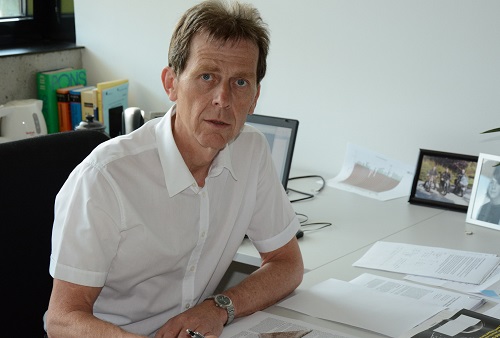Together with GraalVM, in April Oracle launched new software technology that has its roots at the JKU.

As part of a research project, the Institute for Systems Software (Prof. Hanspeter Mössenböck) has been working together with Oracle (Oracle Labs) for the past 18 years. In the meanwhile, Oracle is now located at the JKU and has over a dozen employees (mostly former JKU post-doc candidates).
GraalVM is a brand new open-source software environment that allows programming languages such as Java, C/C++ and JavaScript to work seamlessly together. A highly optimized dynamic compiler ensures top performance. The key feature is that the programs running under GraalVM optimize themselves during operational times. They collect information while they are running and use it to become faster, similar to a turbocharging effect. Languages such as JavaScript, Python or Ruby (whose programs are typically 50-100 times slower than C programs) are so well optimized by GraalVM that they approach C’s execution speeds.
The Graal Project began at the JKU in 2010 by former doctoral candidates Thomas Würthinger and Lukas Stadler. The goal was to create a highly optimized compiler to ensure efficient interaction between different programming languages (Graal) as well as a system to independently optimize the execution of multilingual programs (Truffle). Both are completely new concepts that are now being further developed by Oracle Labs and combined with language-independent tools to create GraalVM. GraalVM has the potential to be used by millions of software developers and users around the world. Product operations at Twitter, for example, use a Graal compiler.
Together with a dozen other JKU alumni, Thomas Würthinger and Lukas Stadler currently work for Oracle. Dr. Würthinger is the Senior Research Director at Oracle Labs and responsible for the GraalVM project: “The international research environment at the JKU inspired me during my studies and enabled me early on to conduct high-quality research on an international level. The JKU is one of the project’s most important research partners.”
Prof. Mössenböck’s lab at the JKU continues to conduct research, “The fact that Oracle has a research lab at the JKU and is working with us on one of its core technologies shows that computer sciences at the JKU enjoys top, international recognition.” Over the past 5 years, his group has worked together with Oracle Labs and published some 40 international publications on the topic, including co-operation with renowned researchers at other universities. The project has yielded 7 dissertations (two of those with "sub auspiciis praesidentis" honors, meaning graduating in the presence of the Austrian President). As part of the research collaboration, the JKU has managed to raise several million euros in external funding.








